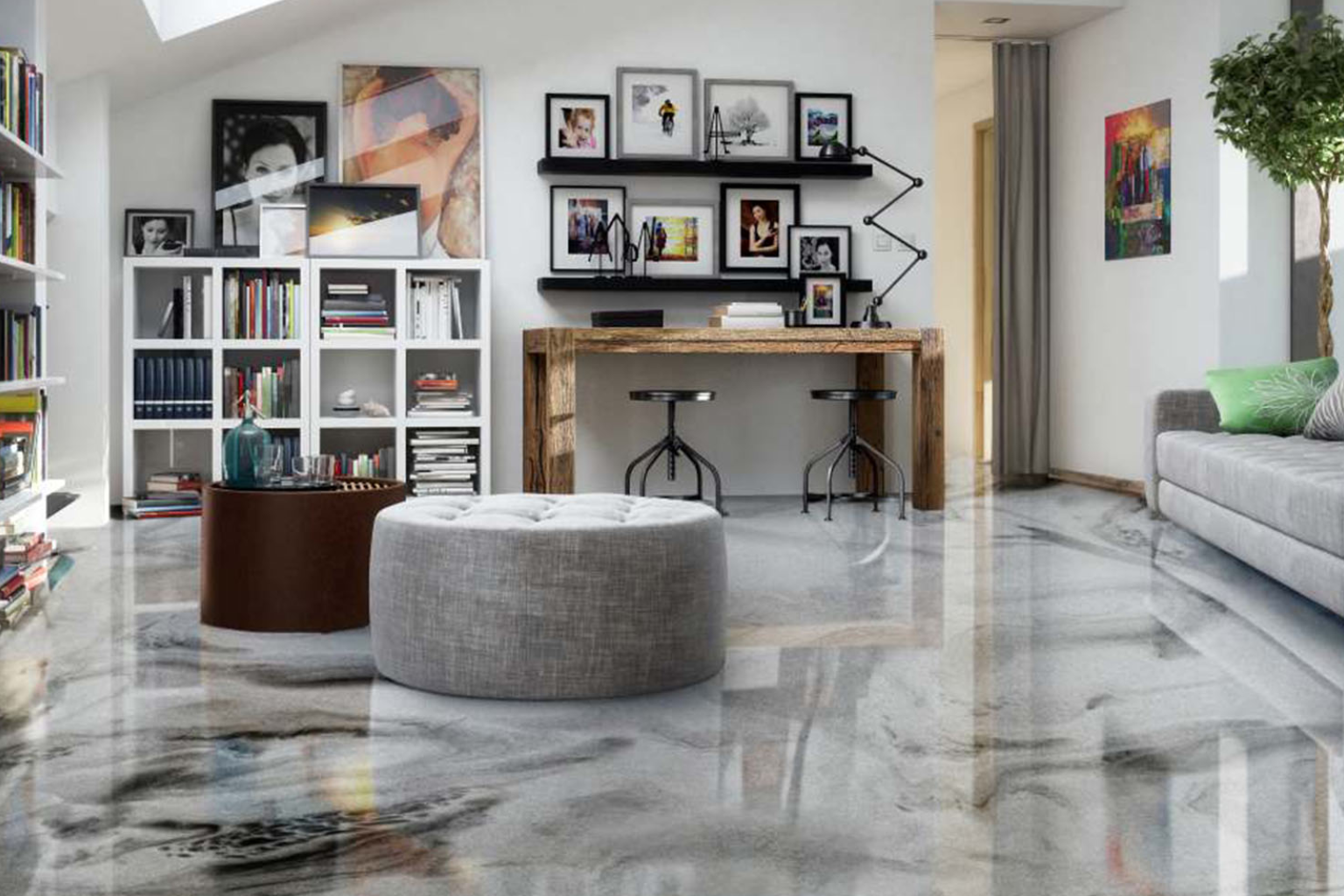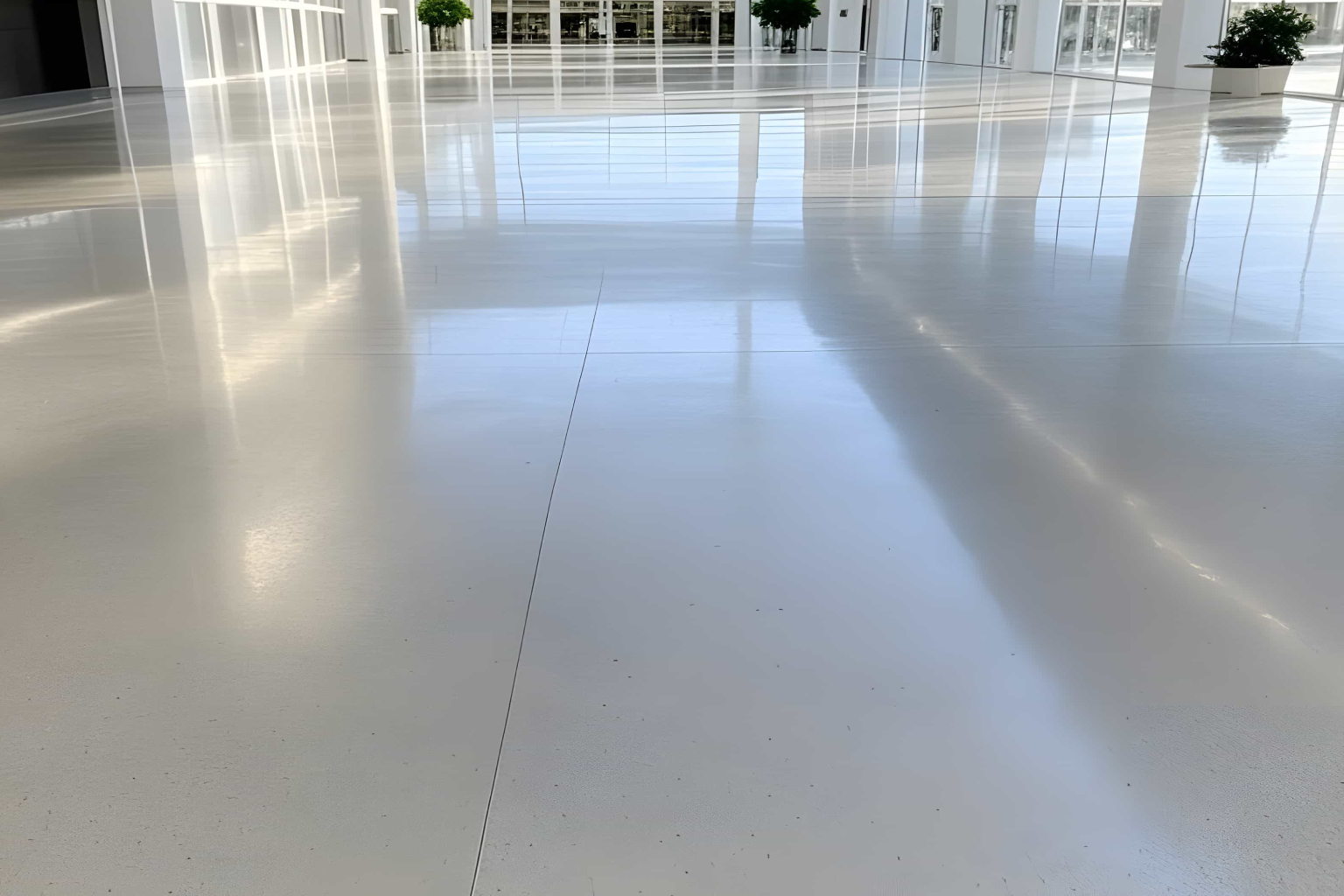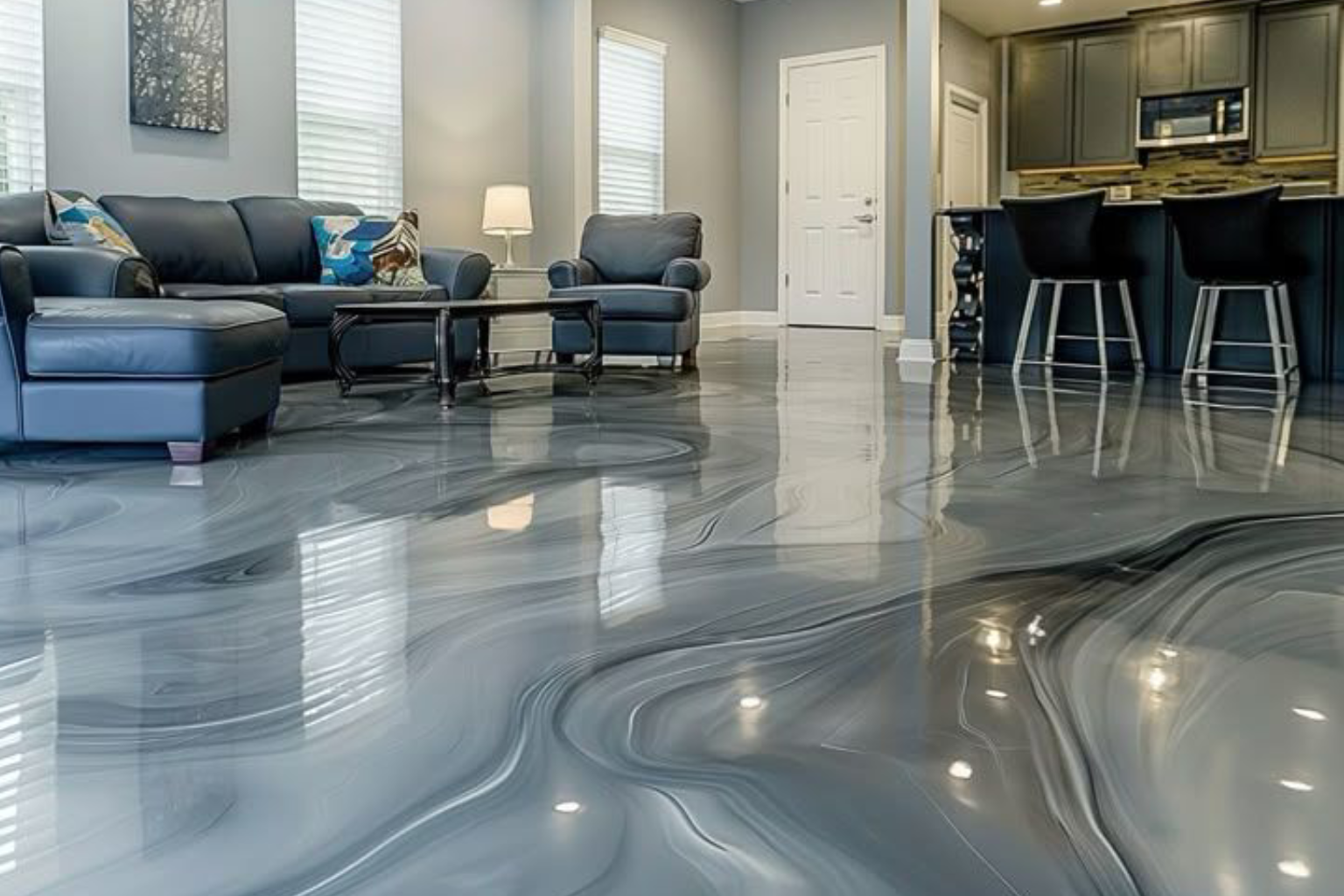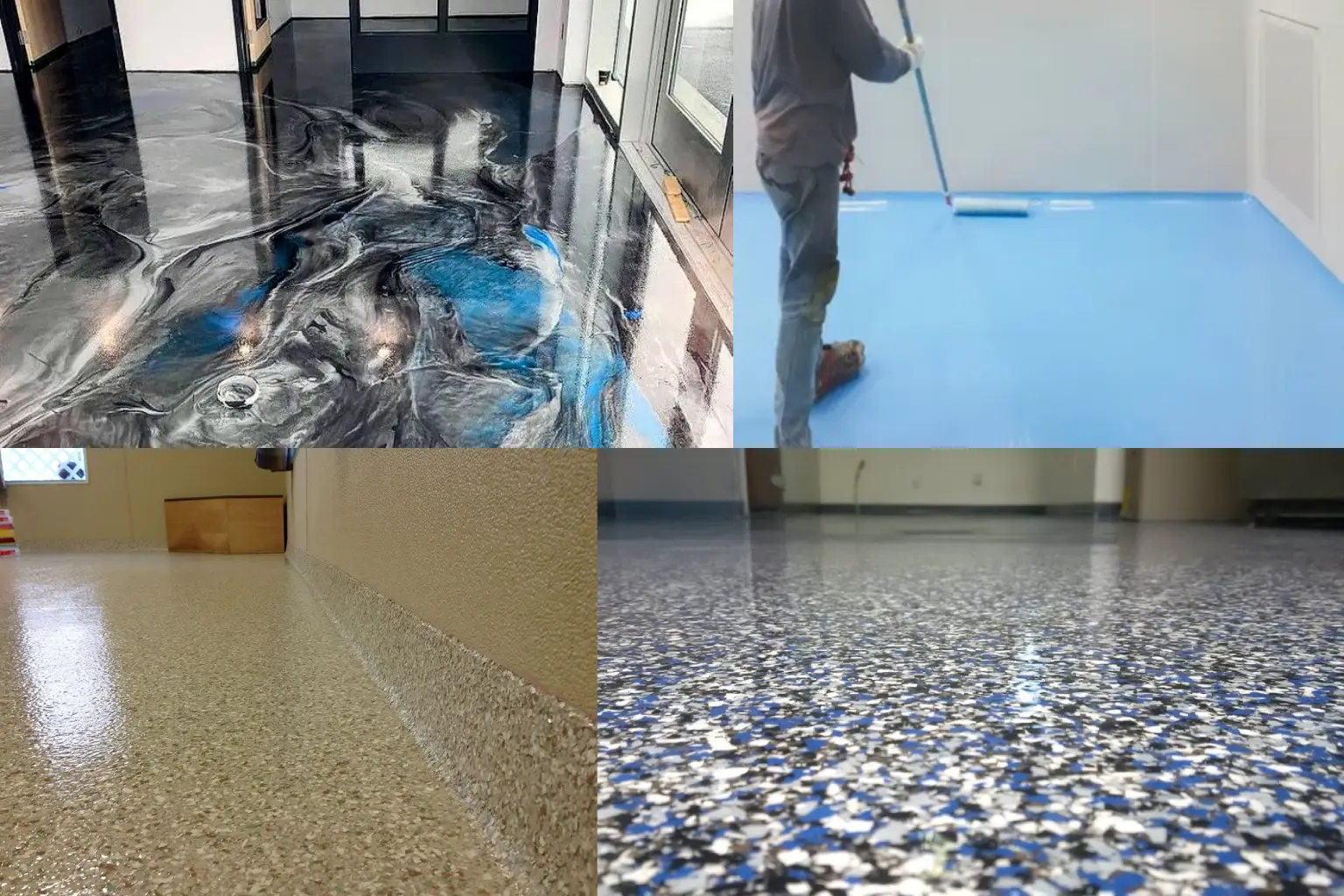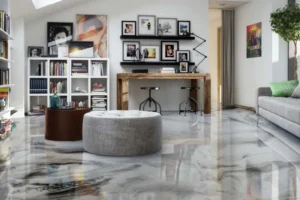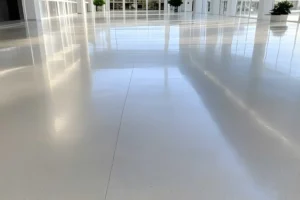Epoxy flooring is a durable and shiny floor covering that can work in many different spaces. Epoxy flooring resin and hardener are mixed, and they go through the curing process. The resin and hardener build a tough, glossy surface on your cement pad. Epoxy flooring is a favorite option because it’s simple to maintain, very durable, and gives a clean, attractive look.
There are many types of epoxy flooring, and each type has its own style, strength, and use. Some of the types will work very well in your garage and garage floor, while other types will work better in kitchens or basements. Which epoxy will work best depends on its intended use, as well as the attributes of the surface you would like.
In this blog, we will look at the different types of epoxy floors, list some benefits of epoxy flooring types, and help you come to a decision on what epoxy flooring is best for your needs.
What is Epoxy Flooring?
Let’s begin with the baseline question: What is Epoxy flooring? It’s a type of floor coating made by mixing two main parts: a resin and a hardener. Together, they form a strong surface. When resin and hardener are combined, they form a strong, even, and shiny surface. Many epoxy coatings are used for concrete floors to protect the surface and give it a nice aesthetic.
Epoxy flooring works well in homes and garages. It has a more significant use as a commercial epoxy space as well, especially in parts that see high foot traffic, as well as being low-maintenance. An epoxy floor for your spaces is typically found in hundreds of different colors and designs.
Main Types of Epoxy Flooring
Epoxy flooring comes in a variety of types. Each epoxy type is customized for specific functional and aesthetic needs across different settings. These are the different types of epoxy flooring. You must know how to make the right decision:

1. Solid Epoxy Coating
Solid epoxy coating is one of the strongest and most long-lasting types of epoxy flooring available today. It creates a thick, smooth surface that can hold up to harsh foot traffic, heavy tools, and even vehicles. That’s why this type works best as epoxy for garages, warehouses, and industrial spaces.

Solid color epoxy coatings are available in a wide range of shades and finishes, so they can look great and clean while still maintaining their strength. They even resist stains, chemicals, and wear. If you are looking for a durable floor that is going to maintain its strength over time, then this is probably one of the best epoxy flooring options available.
2. Self-Leveling Epoxy
Self-leveling epoxy floor for your spaces is a liquid floor coating that spreads out on its own. It fills in cracks, dents, and uneven spots to create a smooth, flat surface. After drying, it will create a smooth, high-gloss surface that will solidify. This makes it one of the most favored epoxies for flooring with both residential customers as well as businesses.

Self-leveling epoxy will cause wonders in areas such as kitchens, bathrooms, and basements, and is very effective for older and/or uneven concrete floors that require a fresh and clean appearance.
Self-leveling epoxy is popular because it has a great appearance and long-lasting durability. It is easy to clean high-gloss surface is very durable. Self-leveling epoxies are often the first choice when various spaces require a flat surface without much effort.
3. Metallic Epoxy Flooring
Metallic epoxy flooring is known for its aesthetic appeal thanks to a sophisticated design and a smooth, glossy finish. Metallic epoxy is seen as one of the most stylish and eye-catching epoxy flooring choices available.

- Has a shiny, swirl-like look that creates a reflection from the light
- Made simply by adding metallic powders to the epoxy to create that special effect
- Each floor is unique because it can look like waves, marble, etc.
- The style is very popular, calling attention to showrooms or as “living rooms” in the living space
- Makes a bold, stylish statement
- A great option if you want the best epoxy for other spaces requiring a unique and artistic touch in any area
- Metallic epoxy is a smart option if you want a floor that looks modern and stays tough over time.
4. Quartz-Filled Epoxy Flooring
Quartz Epoxy Flooring is a hard surface with added textured coats of epoxy combined with small amounts of sand or colored quartz to give it a rough finish that reduces the risk of slipping. It is considered one of the safest forms of epoxy flooring on the market. Quartz epoxy flooring is highly beneficial for any area that can get wet and has high foot traffic, such as locker rooms, commercial kitchens, and pool decks.

Different texture options give good grip and help stop slips or falls. The quartz pieces also come in nice colors, so the floor looks great. This makes it a smart choice for a floor that is both safe and stylish. Therefore, it is easily one of the most versatile forms of epoxy flooring for providing beauty and durability, and a high slip-resistance for either your home or business.
5. Epoxy Flake Flooring
Epoxy flake flooring is a fun, stylish, and colorful style of flooring where small, colored flakes are mixed in with the epoxy. The epoxy flakes create a textured look with a mix of colors, giving the floor a fun and custom style that feels unique to your space.

This type of flooring is commonly used in garages, basements, and laundry rooms because it is durable, easy to clean, and hides a lot of dirt. If you want a fun-looking surface with the durability of epoxy flooring that hides dirt and stains, this is a great option.
6. Vapor Barrier Epoxy
Vapor barrier epoxy helps to prevent moisture from coming up through concrete floors. This can be extremely helpful in basements and damp-feeling rooms in the home. Vapor barrier epoxy creates a protective layer that stops moisture from coming up through the concrete floor.
Many homeowners will also use this type of epoxy flooring before applying other epoxy flooring options to protect the substrate’s ability to remain dry and strong. Vapor barrier epoxy is a great choice for areas with moisture issues, making it ideal for spaces that need protection from water.
Choosing Your Epoxy Product
- What space will be used, such as epoxy for the kitchen, basement, garage, and so on.
- For heavy use, such as garages and workspaces, use a solid epoxy coating.
- If the floor has cracks or is uneven, self-leveling epoxy can help create a smooth and flat surface.
- To make a strong statement, consider metallic epoxy flooring.
- In wet and slippery situations, utilize quartz-filled epoxy for safety.
- If you need a splash of color and want to disguise dirt, consider epoxy flake flooring.
- In damp spaces (like basements), utilize the vapor barrier epoxy first.
- As with all flooring, you should always consider the type of flooring that meets your needs and the conditions of the room.
Maintenance Tips for Epoxy Floor
Once you have installed the appropriate epoxy flooring, it is not difficult to keep it in excellent shape while you maintain it properly. With regular maintenance, the floor can remain shiny, clean, and durable for many years.
Here are some suggestions:
- Clean often: Regularly sweep and/or dust mop the dirt and grit off the surface.
- Use a mild cleaning solution: When the time comes to mop the floor, just use warm water and a mild detergent to mop the floor (not a strong pH detergent that could dull the surface).
- Wipe spills immediately: Stains occur because spills have not been wiped up when they happen; attend to spills to keep the surface looking new!
- Prevent heavy impacts on the surface of the epoxy coatings or flooring: Use mats or pads under heavy tools, floors, and furniture, which will prevent scratches.
- Recoat as necessary: After a time, you can always recoat the topcoat to bring back some gloss and an adherent surface in the coatings’ properties.
Typically, epoxy floors are known as the floors that last and are easy to maintain. A little or regular maintenance will keep your flooring looking fantastic for decades.
Conclusion
There are many different types of epoxy flooring to choose from, and they have specific uses. No matter how you want the look of the floor to be (strong, shiny, safe, stylish), there are many epoxy flooring options to sync it with your space. Take time to consider where the floor will be going and what it will be dealing with to help you find the best epoxy for different spaces that you will enjoy for years and can show off.
FAQs
What is the most durable epoxy floor system?
The most durable epoxy floor system is 100% solid epoxy with a polyurethane or polyaspartic topcoat, which provides maximum resistance to heavy impact, chemicals, and abrasions. This system is often used in industrial settings and garages because it can withstand high traffic and extreme conditions for many years.
Can I use anti-static epoxy in a data center?
Yes, anti-static epoxy flooring is ideal for data centers because it helps prevent electrostatic discharge (ESD), which can damage sensitive electronic equipment. This type of epoxy is designed to safely dissipate static electricity, making it a smart and protective choice for tech environments.
How long does each type of epoxy floor last?
Epoxy floor life depends on the type,100% solid epoxy lasts 20 to 25 years, while water- and solvent-based types last 5–10 years. Proper installation and regular maintenance also play a big role in extending the life of the epoxy floor system.



